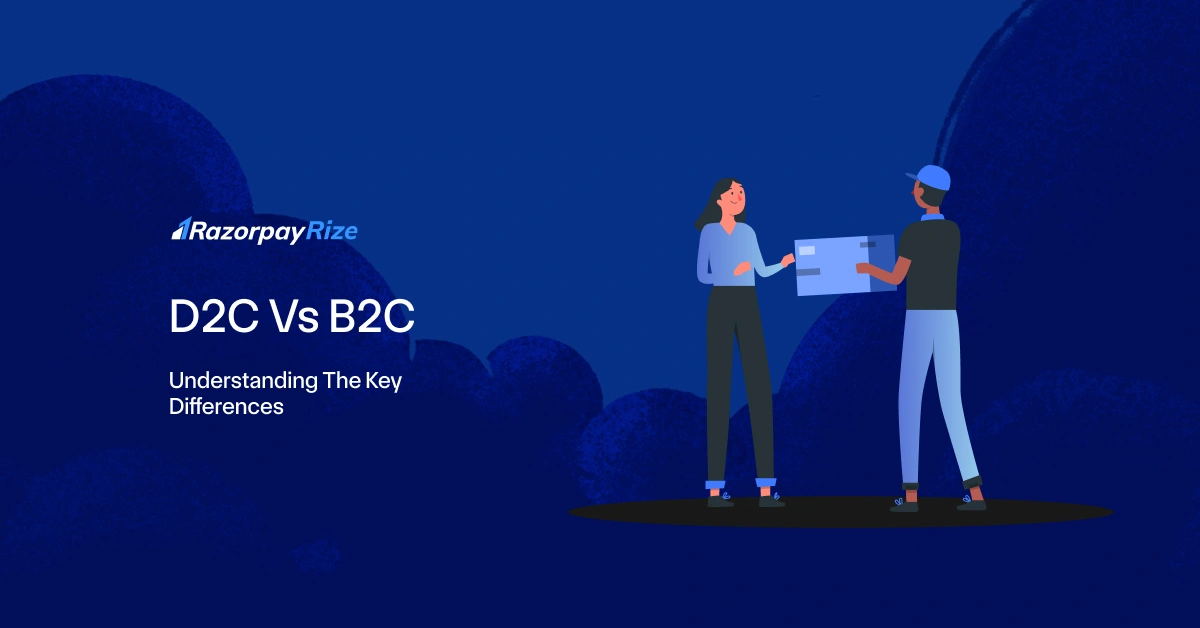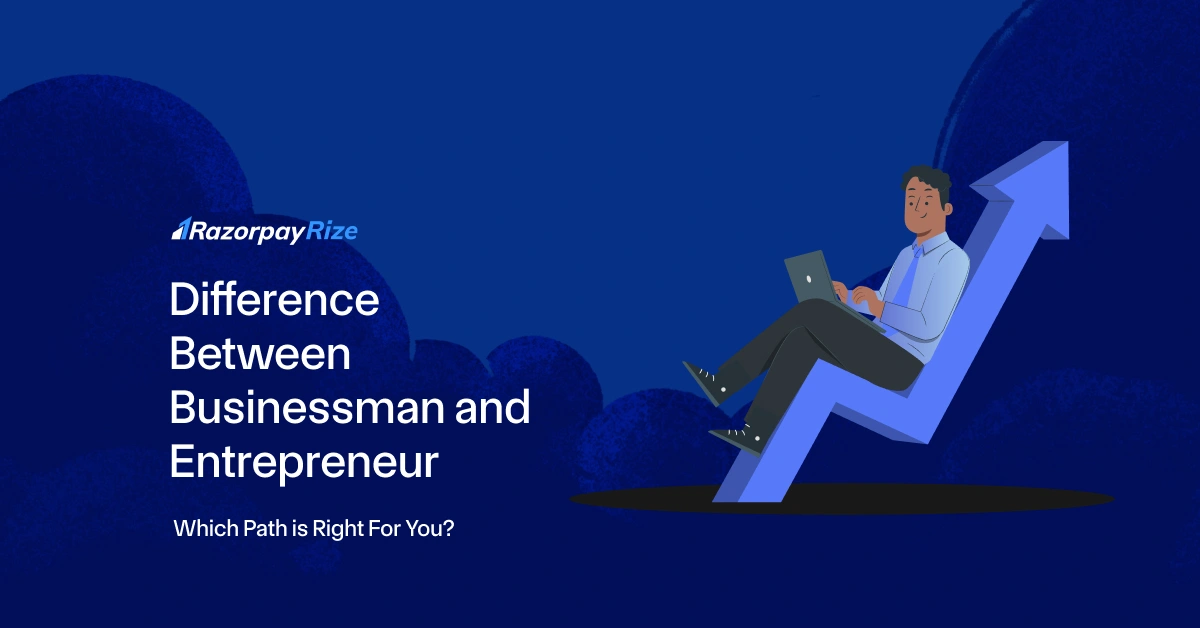Entrepreneur Vs Businessman: Know the Differences Now!
To clearly understand the difference between entrepreneur and business man, let's compare their key characteristics:
| Aspect |
Entrepreneur |
Businessman |
| Definition |
Starts an enterprise based on a new idea or concept |
Sets up a business with an existing idea |
| Innovation |
Constantly works towards innovation in products, business models, and marketing strategies |
Focuses on executing known business ideas and models |
| Risk-taking |
Willing to take greater risks for higher rewards |
Takes calculated risks and prefers tested methods |
| Motivation |
Driven by the desire to innovate, create, and make an impact |
Primarily motivated by making money and generating profits |
| Approach |
Unconventional; creates new markets and explores uncharted territories |
Conventional; operates based on existing market conditions |
| Resources |
Usually starts with limited resources and arranges them along the way |
Mostly starts with adequate capital and business skills |
| Competition |
Aims to make competition irrelevant by creating new uncontested market spaces |
Tries to capture market share from existing players |
| Growth |
Always looking for rapid and significant growth |
Satisfied with slow and steady growth as long as the business remains profitable |
By examining these key differences, you can begin to understand the distinct mindsets and approaches that define an entrepreneur and a businessman. While entrepreneurs bring innovation and disruption to industries, businessmen excel at optimising existing models for profitability and longevity.
Who is a Businessman?
A businessman is an individual who operates within the confines of an existing market, focusing on profitability and stability. They typically follow proven business models, work with lower risks, and aim for steady growth rather than groundbreaking innovation. Businessmen are skilled at identifying opportunities within established industries and leveraging their expertise to maximise returns.
Qualities of a Businessman
To succeed as a businessman, one must possess a unique set of qualities that enable them to navigate the challenges of running a business effectively. Some of the essential qualities of a successful businessman include:
- Strong decision-making skills to navigate complex business situations
- Effective risk management to minimise potential losses
- Excellent leadership abilities to guide teams towards common goals
- Financial acumen to optimise budgets and maximise profits
- Adaptability to changing market conditions and consumer demands
A businessman with these qualities can effectively steer their organisation towards profitability, make sound financial decisions, and lead their team to achieve targets and milestones.
Types of Businessman
Businessmen can be categorised based on their business model and operations. Some common types of businessmen include:
- Small Business Owners: These individuals own and operate small-scale businesses, often in local markets or niche industries.
- Traders: Businessmen who engage in buying and selling goods or services for profit, often in wholesale or retail markets.
- Manufacturers: Those who own and manage manufacturing facilities, producing goods for sale to other businesses or consumers.
- Franchise Owners: Businessmen who operate a business under a franchising agreement, following established business models and brand guidelines.
- Corporate Businessmen: High-level executives or managers within large corporations, responsible for overseeing departments or entire business units.
Each type of businessman contributes to the economy in their own way, whether by providing employment opportunities, generating revenue, or contributing to the overall growth of their industry.
Who is an Entrepreneur?
An entrepreneur is an individual who identifies a problem or opportunity, takes on the risk of starting a new venture to address it, and comes up with innovative ideas to disrupt the market. Entrepreneurs are driven by a passion for solving problems and creating value, often venturing into uncharted territories to bring their vision to life.
Entrepreneurs focus on building scalable businesses from the ground up, constantly seeking new ways to innovate and improve upon existing solutions. They are not afraid to challenge the status quo and take bold risks in pursuit of their goals. Some famous examples of entrepreneurs include Bill Gates (Microsoft), Steve Jobs (Apple), Elon Musk (Tesla, SpaceX), and Jeff Bezos (Amazon), all of whom founded highly innovative companies that revolutionised entire industries.
Qualities of an Entrepreneur
Successful entrepreneurs possess a distinct set of qualities that enable them to navigate the challenges of starting and growing a business. Some of the key qualities of an entrepreneur include:
- Innovative thinking to come up with original, impactful ideas
- Comfort with taking risks to bring unproven concepts to market
- Resilience to overcome the many challenges of starting a business
- Strong leadership skills to build and inspire talented teams
- Adaptability to pivot business strategies as needed
- Creative problem-solving abilities to navigate uncharted territory
These qualities help entrepreneurs blaze new trails and create value in the world.
Entrepreneurs with these qualities are well-equipped to identify market gaps, develop unique solutions, and persevere through the ups and downs of building a successful venture.
Types of Entrepreneur
Entrepreneurs can be classified based on their approach, industry, and level of innovation. Some common types of entrepreneurs include:
- Small Business Entrepreneurs: These individuals start and run small businesses, often serving local markets or niche industries.
- Scalable Startup Entrepreneurs: Entrepreneurs who focus on building high-growth, innovative companies with the potential to scale rapidly and disrupt markets.
- Social Entrepreneurs: Those who start ventures with the primary goal of creating social or environmental impact, often addressing pressing societal issues.
- Corporate Entrepreneurs (Intrapreneurs): Entrepreneurs who operate within large corporations, driving innovation and new business development from within.
- Innovative Entrepreneurs: Entrepreneurs who consistently push the boundaries of their industries, introducing groundbreaking products, services, or business models.
Each type of entrepreneur brings a unique perspective and set of skills to the table, contributing to the overall diversity and dynamism of the business world.
Similarities Between Entrepreneurs and Businessmen
Despite their differences, entrepreneurs and businessmen share some common traits and characteristics that contribute to their success. These similarities include:
- Leadership skills: Both roles require the ability to lead and motivate teams, set goals, and make critical decisions.
- Goal orientation: Entrepreneurs and businessmen are driven by their goals, whether it's building a successful startup or growing an established company.
- Financial management: Both must be skilled at managing finances, creating budgets, and making sound financial decisions.
- Market understanding: A deep understanding of their target market, customer needs, and industry trends is essential for both entrepreneurs and businessmen.
While their approaches may differ, both entrepreneurs and businessmen play crucial roles in driving economic growth, creating jobs, and generating value for their stakeholders. Recognising these shared traits can help aspiring entrepreneurs and businessmen focus on developing the skills and qualities that are most likely to contribute to their success, regardless of the path they choose.
Final Thoughts
Choosing between the path of an entrepreneur or a businessman ultimately depends on your individual goals, risk appetite, and preferred work style. If you thrive on stability, have strong management skills, and prefer working with established business models, the path of a businessman may be right for you. On the other hand, if you're a passionate risk-taker with a drive to solve problems and disrupt industries with innovative ideas, entrepreneurship could be your calling.
Regardless of the path you choose, understanding the difference between a businessman and an entrepreneur is crucial in aligning your skills and passions with your professional goals. By recognising the key differences between entrepreneur and business man, you can make an informed decision about which route best suits your unique strengths and aspirations.
Ultimately, both entrepreneurs and businessmen contribute significantly to the economy, and society needs each type to thrive. The key is to align your career path with your unique strengths, passions, and goals. Whether you choose to be an innovator or an optimiser, the business world offers endless opportunities for growth and success.
Frequently Asked Questions















